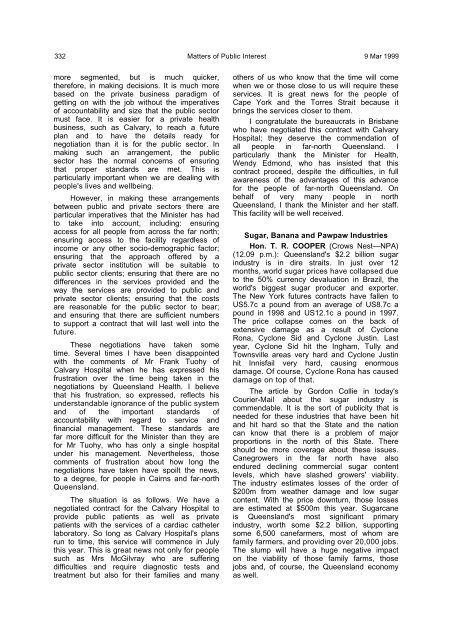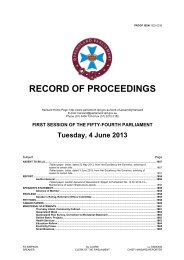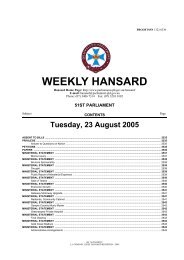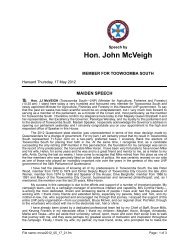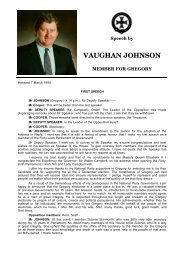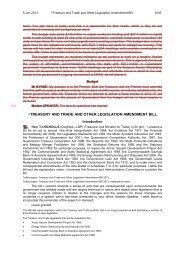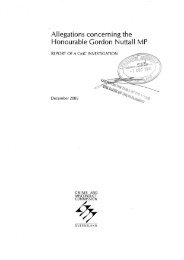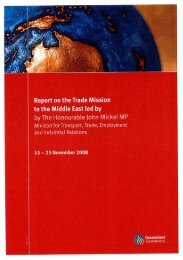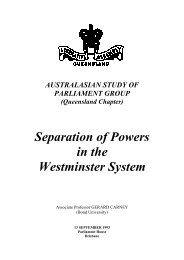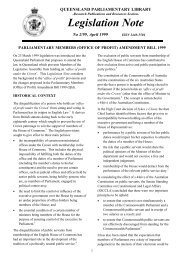Full transcript - Final - Queensland Parliament - Queensland ...
Full transcript - Final - Queensland Parliament - Queensland ...
Full transcript - Final - Queensland Parliament - Queensland ...
Create successful ePaper yourself
Turn your PDF publications into a flip-book with our unique Google optimized e-Paper software.
332 Matters of Public Interest 9 Mar 1999<br />
more segmented, but is much quicker,<br />
therefore, in making decisions. It is much more<br />
based on the private business paradigm of<br />
getting on with the job without the imperatives<br />
of accountability and size that the public sector<br />
must face. It is easier for a private health<br />
business, such as Calvary, to reach a future<br />
plan and to have the details ready for<br />
negotiation than it is for the public sector. In<br />
making such an arrangement, the public<br />
sector has the normal concerns of ensuring<br />
that proper standards are met. This is<br />
particularly important when we are dealing with<br />
people's lives and wellbeing.<br />
However, in making these arrangements<br />
between public and private sectors there are<br />
particular imperatives that the Minister has had<br />
to take into account, including: ensuring<br />
access for all people from across the far north;<br />
ensuring access to the facility regardless of<br />
income or any other socio-demographic factor;<br />
ensuring that the approach offered by a<br />
private sector institution will be suitable to<br />
public sector clients; ensuring that there are no<br />
differences in the services provided and the<br />
way the services are provided to public and<br />
private sector clients; ensuring that the costs<br />
are reasonable for the public sector to bear;<br />
and ensuring that there are sufficient numbers<br />
to support a contract that will last well into the<br />
future.<br />
These negotiations have taken some<br />
time. Several times I have been disappointed<br />
with the comments of Mr Frank Tuohy of<br />
Calvary Hospital when he has expressed his<br />
frustration over the time being taken in the<br />
negotiations by <strong>Queensland</strong> Health. I believe<br />
that his frustration, so expressed, reflects his<br />
understandable ignorance of the public system<br />
and of the important standards of<br />
accountability with regard to service and<br />
financial management. These standards are<br />
far more difficult for the Minister than they are<br />
for Mr Tuohy, who has only a single hospital<br />
under his management. Nevertheless, those<br />
comments of frustration about how long the<br />
negotiations have taken have spoilt the news,<br />
to a degree, for people in Cairns and far-north<br />
<strong>Queensland</strong>.<br />
The situation is as follows. We have a<br />
negotiated contract for the Calvary Hospital to<br />
provide public patients as well as private<br />
patients with the services of a cardiac catheter<br />
laboratory. So long as Calvary Hospital's plans<br />
run to time, this service will commence in July<br />
this year. This is great news not only for people<br />
such as Mrs McGilvray who are suffering<br />
difficulties and require diagnostic tests and<br />
treatment but also for their families and many<br />
others of us who know that the time will come<br />
when we or those close to us will require these<br />
services. It is great news for the people of<br />
Cape York and the Torres Strait because it<br />
brings the services closer to them.<br />
I congratulate the bureaucrats in Brisbane<br />
who have negotiated this contract with Calvary<br />
Hospital; they deserve the commendation of<br />
all people in far-north <strong>Queensland</strong>. I<br />
particularly thank the Minister for Health,<br />
Wendy Edmond, who has insisted that this<br />
contract proceed, despite the difficulties, in full<br />
awareness of the advantages of this advance<br />
for the people of far-north <strong>Queensland</strong>. On<br />
behalf of very many people in north<br />
<strong>Queensland</strong>, I thank the Minister and her staff.<br />
This facility will be well received.<br />
Sugar, Banana and Pawpaw Industries<br />
Hon. T. R. COOPER (Crows Nest—NPA)<br />
(12.09 p.m.): <strong>Queensland</strong>'s $2.2 billion sugar<br />
industry is in dire straits. In just over 12<br />
months, world sugar prices have collapsed due<br />
to the 50% currency devaluation in Brazil, the<br />
world's biggest sugar producer and exporter.<br />
The New York futures contracts have fallen to<br />
US5.7c a pound from an average of US8.7c a<br />
pound in 1998 and US12.1c a pound in 1997.<br />
The price collapse comes on the back of<br />
extensive damage as a result of Cyclone<br />
Rona, Cyclone Sid and Cyclone Justin. Last<br />
year, Cyclone Sid hit the Ingham, Tully and<br />
Townsville areas very hard and Cyclone Justin<br />
hit Innisfail very hard, causing enormous<br />
damage. Of course, Cyclone Rona has caused<br />
damage on top of that.<br />
The article by Gordon Collie in today's<br />
Courier-Mail about the sugar industry is<br />
commendable. It is the sort of publicity that is<br />
needed for these industries that have been hit<br />
and hit hard so that the State and the nation<br />
can know that there is a problem of major<br />
proportions in the north of this State. There<br />
should be more coverage about these issues.<br />
Canegrowers in the far north have also<br />
endured declining commercial sugar content<br />
levels, which have slashed growers' viability.<br />
The industry estimates losses of the order of<br />
$200m from weather damage and low sugar<br />
content. With the price downturn, those losses<br />
are estimated at $500m this year. Sugarcane<br />
is <strong>Queensland</strong>'s most significant primary<br />
industry, worth some $2.2 billion, supporting<br />
some 6,500 canefarmers, most of whom are<br />
family farmers, and providing over 20,000 jobs.<br />
The slump will have a huge negative impact<br />
on the viability of those family farms, those<br />
jobs and, of course, the <strong>Queensland</strong> economy<br />
as well.


